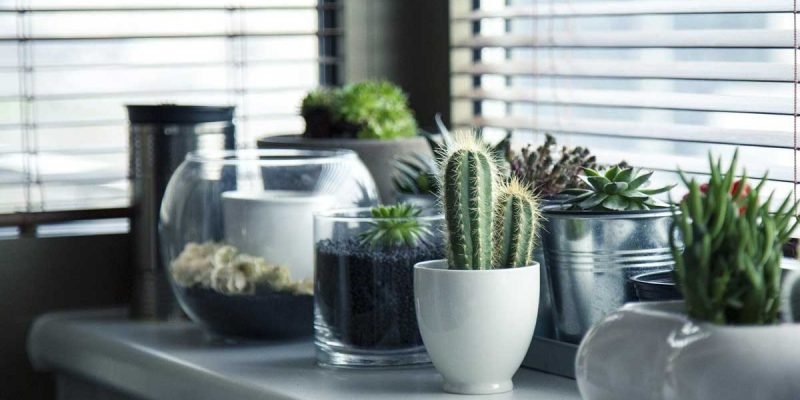Plants in your bedroom can transform the area into a sanctuary-a tranquil, peaceful space for you to retreat to and seek serenity after a hectic day. In addition to creating an oasis-like environment, plants do so much more. Oxygen is replenished, and the air is purified. This can aid in a better night’s sleep, and what could be more stress-relieving than that.
In Spite of having modern bedroom furniture, these plants add extra aura and value in your bedroom.
However, some plants are more effective than other house plants at helping us sleep. You can actually fall asleep faster with the help of several bedroom plants. In addition to their relaxing scents, air-purifying properties, and easy maintenance, these products are great for speeding up the snoozing process.
Here are our picks for your much-needed 10 Best Bedroom Plants to Help You Sleep Better!
1. Jasmine (Jasminum)
Its scent may remind you of some of your favorite perfumes, but jasmine’s delicate aroma will do much more than please your sense of smell. Jasmine is well known for its sweet smell and is considered the most appropriate houseplant to choose. Candles scented with this lovely scent are often used for aromatherapy, and studies show that smelling it reduces anxiety and improves sleep. You can reap the benefits of a Jasmine houseplant by placing it next to your bed.
2. Snake Plant (Sansevieria trifasciata)
Snake plants, also called viper’s bowstring hemp after its menacing name, are among a group of plants renowned for their ability to purify indoor air. According to a NASA study, snake plants are capable of converting toxic substances into clean air.
In order to keep your snake plant healthy, water it regularly throughout the growing season and trim it during the fall and winter. Keep a low-maintenance snake plant by your bedside instead of paying attention to its threatening name.
3. Lavender (Lavandula angustifolia)
The smell of lavender is known everywhere as a helpful relaxation aid. Because lavender lowers blood pressure, heart rate, and stress levels, it’s ideal for the bedroom. Lavender in bath oil has been proven to calm babies and send them off to sleep more profoundly and reduce mothers’ stress levels.
Make sure your lavender plant gets plenty of sunlight and warmth by placing it on a sunny windowsill. Researchers found that using lavender essential oil before sleeping improved sleep quality compared to the control group in a 2015 study. Ensure you prune your lavender plant every spring after new leaves appear if you choose to keep one in your bedroom. The sweet aroma of lavender makes it a great addition to your bedroom.
4. Aloe Vera ( Aloe Barbadensis Miller)
The Aloe plant is one of nature’s most healing plants-the Egyptians called it “the plant of immortality. Its gel is great at soothing minor cuts and sunburns, and aloe vera juice is well known as an aid to indigestion and also strengthens your immune system. Furthermore, it releases a lot of oxygen at night (some plants release oxygen during the day and carbon dioxide at night), which is excellent for purifying the air and lowering the levels of benzene.
This succulent is also very easy to take care of: it needs some direct sun in the morning and afternoon but is only watered after prolonged periods of arid soil. Try gently squeezing the leaf; if it’s firm, you don’t need to water; if it’s pliable, it requires water.
5.Chamomile (Matricaria chamomilla)
Besides being visually pleasing, this herb is also used in teas, essential oils, and other things designed to help people relax and unwind. According to a study, chamomile induces sleep, making it more likely that you will have an uninterrupted sleep. Consider keeping it near your bed, perhaps with a fresh lavender plant, to breathe in the calming and relaxing aroma. In addition, your plant’s blooms can be used to make chamomile tea and oils.
6. Golden Pothos(Epipremnum aureum)
Golden Pothos, also known as a super air purifier, is perfect for your bedroom. You can plant in a traditional plant pot or a hanging basket for extra efficiency.
While you sleep, the Golden Pothos purifies the air by removing toxins such as carbon monoxide and formaldehyde.
You only need to water this low-maintenance plant once the soil is parched, and it can grow in low-light areas. Please be aware that this plant is dangerous if ingested by children or animals.
7. Purple Passionflower (Passiflora incarnata)
In addition to its anxiety-reducing effects, purple passionflower may aid in establishing good sleep patterns. Extracts from the flower, taken with oxazepam, were found to help participants cope with anxiety in clinical trials.11 Their bloom features a crown of purple filaments. The purple passionflower also produces a maypop fruit, which is edible.
8.Valerian (Valeriana officinalis)
A valerian plant will look stunning in your bedroom with tiny pink and white flowers. In addition to their sweet scent, valerian plants have treated insomnia for centuries. Valerian root is proven to induce sleep and improve sleep quality when inhaled. Take a sniff before your tableside, Valerian, or add a few petals to your bath before you get into bed. Keep them on a window sill to provide six hours of sun a day.
9. Spider Plant ( Chlorophytum Comosum)
These are so popular because they’re easy to grow and are incredibly effective at producing new plants! Spider plants are easy to maintain as long as they get moderate, indirect sunlight and are occasionally watered. Taking care of indoor plants can reduce blood pressure and make you feel soothed, making it a perfect activity for you to improve your mental health and promote sleep in your system.
A spider plant can also make a wonderful gift. It’s easy to root your baby plants in a small pot of water when your adult plant sprouts babies. You can transplant your baby plants into the soil after the roots are established. These are great for hanging pots since their leaves are long and hanging.
10. Gardenia (Gardenia jasminoides)
You’ll often find gardenias in flower gardens, which have a fragrant scent. Flower fragrances reduce stress and induce sleep by releasing a fresh, pleasant smell. According to one study, the gardenia flower is a viable natural alternative to sleeping pills like Valium. According to another survey, Gardenia flowers may reduce the chances of waking up in the middle of the night and promote a night of restful sleep. When insomnia strikes, instead of reaching for a sleeping aid, buy some gardenia for your room for a natural remedy to the problem.
So next time you’re scrolling through your phone at 2 am, wondering if you should get a little plant buddy for your room, come back and give us a read again!














Comments